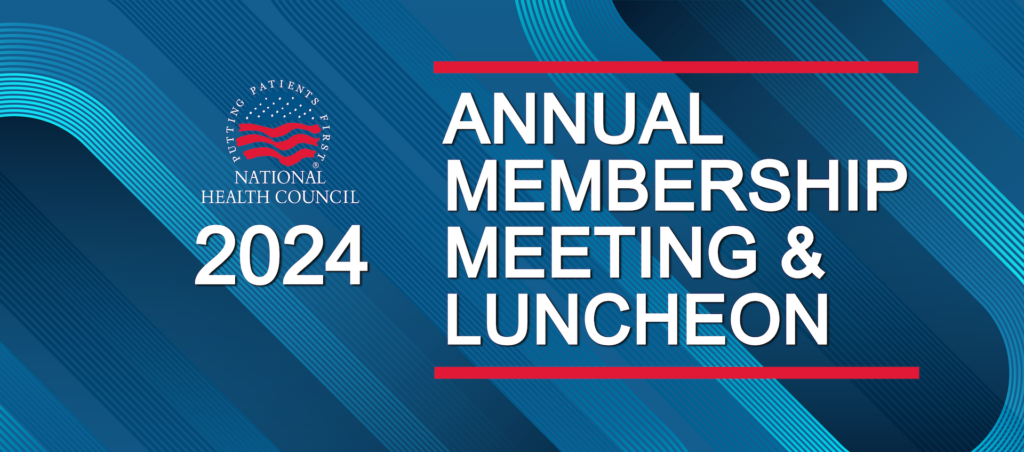

NHC Legislative Health Care Update
By: Allen Pinn, Coordinator, Policy
As the 118th Congress heads into summer, multiple health care issues have taken centerstage. Below are key issues the National Health Council is tracking.
Health Care Costs, Transparency, and Competition
Pharmacy Benefit Managers, often called PBMs, are considered the ‘middlemen’ between health insurers and drug manufacturers. PBMs’ role in the health care system is to assist in negotiating the price of prescription drugs on behalf of multiple stakeholders including larger employers, Medicare Part D drug plans, and other health care payers.
PBMs create and maintain formularies (drug lists) covered by insurers, which determines which drugs are available to patients, their out-of-pocket costs, and access requirements such as prior authorization or step therapy. Recently, PBMs have garnered much interest from congressional leaders in their role in prescription drug costs. PBMs have been criticized for the lack of transparency in their pricing and formulary determinations. Multiple pieces of legislation have been introduced/reintroduced in the 118th to address these concerns including:
- HR 1339 – Pharmacy Benefit Manager Reform Act
- HR 1613 – Drug Price Transparency in Medicaid Act of 2023
- HR 2816 – PBM Sunshine and Accountability Act
- HR 2679 – PBM Accountability Act
Recently, in a hearing between the Senate Health, Education, Labor, and Pensions (HELP) committee, insulin manufacturers, and pharmacy benefit managers, Senators questioned executives from both groups on their business practices surrounding pharmaceutical prices. Throughout the hearing, Senators from both sides of the aisle shared their dismay with both groups. Committee members criticized the growing issue of spread pricing, which occurs when PBMs charge insurers/health plans at a higher rate than what they pay pharmacies for the same drugs.
In addition, to spread pricing criticisms, Senators also noted how the three largest PBMs, CVS Caremark, Express Scripts, and OptumRx control 80% of the prescription drug market, raising anti-competitive concerns. Other Senate committees, such as the Finance and Commerce Committees are also working to address issues related to PBM oversight.
Committees in the House have also taken aim at better understanding the practices of PBMs. This week, the House Oversight and Reform Committee held part one in a series discussing transparency issues surrounding PBMs. Committee members noted multiple times during the hearing that there was a high degree of bipartisanship in addressing transparency issues. The following day, the House Energy and Commerce Committee held a full committee markup on several health care transparency bills, several of which passed in bipartisanship including:
- HR 2666 – Medicaid VBPs for Patients (MVP) Act
- HR 3284 – Providers and Payers COMPETE Act
- HR 3561 – Promoting Access to Treatments and Increasing Extremely Needed Transparency (PATIENT) Act of 2023
Reauthorization of the Pandemic and All-Hazards Preparedness Act
With the end of the COVID-19 Public Health Emergency on May 11, new attention has been given to the reauthorization of the Pandemic and All-Hazards Preparedness Act (PAHPA). Originally passed in 2006 after Hurricane Katrina, PAHPA was established to improve public health and medical preparedness in response to deliberate, accidental, or natural disasters. In a May 4 Senate HELP hearing, both Republicans and Democrats emphasized how the United States was ill-prepared in the beginning of the COVID-19 pandemic and in its coordination of messaging to the public. Notably, Chair Bernie Sanders and Ranking Member Bill Cassidy noted the toll of the pandemic on the health care workforce shortage.
Other legislation surrounding public health emergencies mentioned during the hearing included:
- S 674 – Public Health Infrastructure Save Lives Act
- S 2640 – Disease X Act
- S 1644 – Promising Pathway Act
- S 3913 – Improving Data in Public Health Act
- S 1355 PASTEUR Act of 2023
Similarly, the House Energy and Commerce Committee’s Subcommittee on Health held a hearing on antimicrobial resistance and its emergence as a possible public health threat.
Mental Health & Substance Abuse
Exacerbated by the impact of the COVID-19 Pandemic, the mental health and substance abuse crisis in the United States has policymakers debating a wide range of solutions. Recently, the Senate Finance and HELP Committees held hearings with mental health experts on expanding access to mental health services. In both hearings, Senators drew attention to rising levels of mental health disorders among young people and the shortage of behavioral health workers.
Specifically, the Senate Finance Committee examined how ghost networks have become a growing issue in finding care for individuals seeking mental health services. A ghost network is when an insurer refers a patient to a mental health provider or service in their directory, however when the patient requests help, the service does not exist, or a doctor/mental health provider is not available.
Multiple pieces of bipartisan legislation were highlighted in the hearings including:
- S 462 – Mental Health Professionals Workforce Shortage Loan Repayment Act
- S 4472 – Health Care Capacity for Pediatrics’ Mental Health Act
- S 1378 – COMPLETE Care Act
Conclusion
In addition to the above health care issues, the NHC is also closely monitoring the ongoing discussions and debates surrounding the debt ceiling. In particular, the NHC is actively opposing inclusion of Medicaid work requirements. While most people who receive health care through Medicaid are either employed or unable to work due to disability, imposition of requirements to show proof that you are employed will add additional administrative burden to people and could result in many of them losing access to health care.
The agreement announced by the White House and Congressional leadership over Memorial Day weekend removed the harmful work requirements that had been included in the debt ceiling legislation passed by the House. The NHC will continue to advocate for protecting Medicaid, Medicare, and other health programs in budget negotiations.
As the debt ceiling agreement moves through the legislative process, the NHC will continue examining any new developments regarding work requirements as well as the issues mentioned above.


